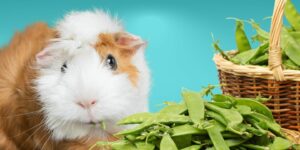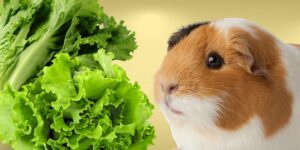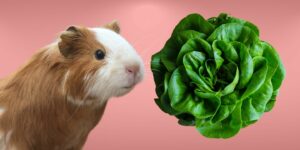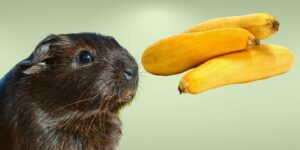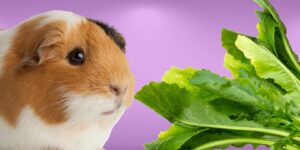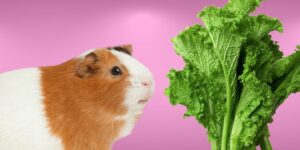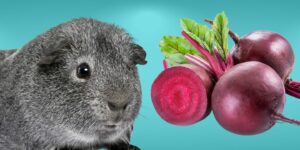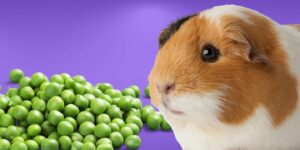Yes, Guinea pigs can eat vegetables as part of a balanced diet. In fact, vegetables should make up the majority of a Guinea pig's diet, alongside a small amount of hay and a limited number of pellets. Understanding the nutritional needs and importance of vegetables in a Guinea pig's diet is crucial for maintaining their health.
Ideal Vegetables for Guinea Pigs
Guinea pigs can enjoy a wide variety of vegetables to meet their nutritional requirements. These can be grouped into leafy greens, root vegetables, cruciferous vegetables, and other vegetables.
Leafy Greens
Leafy greens should make up a significant portion of your Guinea pig's vegetable intake.
Lettuce
Opt for nutrient-rich varieties like Romaine, green leaf, or red leaf lettuce. Avoid iceberg lettuce, as it has low nutritional value.
Spinach
Offer spinach in moderation, as it is high in oxalates, which can contribute to kidney stones.
Kale
Kale is an excellent source of vitamin C, but only feed in moderation due to the high calcium content that can contribute to bladder stones.
Swiss Chard
Rich in vitamins and minerals, Swiss chard can be fed to Guinea pigs occasionally.
Root Vegetables
Root vegetables can provide essential nutrients and some variation for your Guinea pig's diet.
Carrots
Carrots are a good source of vitamin A, but should be fed in moderation due to sugar content.
Bell Peppers
Bell peppers, particularly red and orange varieties, are high in vitamin C.
Sweet Potatoes
Feed sweet potatoes in moderation, as they are relatively high in sugar.
Parsnips
Can be fed occasionally and should be chopped into small pieces.
Celeriac
Rich in vitamin C and fiber, celeriac can be offered in moderation.
Cruciferous Vegetables
Cruciferous vegetables are generally high in nutrients, but should be fed in moderation to avoid causing gas or bloating.
Broccoli
Provide small amounts of broccoli, as it is rich in nutrients but can cause bloating.
Cabbage
Opt for varieties like red, green, or collard, but serve in moderation to avoid gas.
Brussels Sprouts
Offer sparingly, as they can cause gas in Guinea pigs.
Cauliflower
Serve small amounts and avoid large portions due to the risk of gas and bloating.
Other Vegetables
Cucumber
Low in calories and high in water content, cucumber can be a refreshing treat.
Zucchini
Provide zucchini occasionally and cut into small pieces for easy consumption.
Tomato
Can be fed occasionally, but avoid the stems and leaves as they are toxic.
Celery
Chop celery into small pieces to avoid choking hazards from the long fibers.
Key Nutrients and Health Benefits
Feeding a variety of vegetables provides Guinea pigs with essential nutrients, including vitamin C, fiber, antioxidants, and minerals that help support their overall health.
Vitamin C
Guinea pigs, like humans, cannot produce their own vitamin C, making it an essential nutrient to include in their diet. Vitamin C-rich vegetables include bell peppers, kale, and parsley.
Fiber
Fiber helps support healthy digestion in Guinea pigs. High-fiber vegetables include celery, celeriac, and broccoli.
Antioxidants
Antioxidants support a healthy immune system, and many vegetables are rich in these compounds.
Minerals
Minerals such as calcium, phosphorus, and magnesium are essential for maintaining strong bones and overall health in Guinea pigs.
Preparing and Feeding Vegetables
Washing and Cutting
Always wash and peel vegetables before feeding to remove dirt, pesticides, or harmful bacteria. Cut into small, manageable pieces for your Guinea pig.
Portion Sizes and Frequency
An overall guideline is to provide about one cup of vegetables per Guinea pig per day, but portion sizes and frequency will vary depending on the specific vegetable.
Introducing New Vegetables
Introduce new vegetables gradually to avoid digestive upset and monitor for any adverse reactions.
Vegetables to Avoid or Limit
Toxic Vegetables
Do not feed avocado, garlic, or onions, as they can be toxic to Guinea pigs.
High-Sugar Vegetables
Limit the amount of corn and peas, as they can contribute to obesity and dental issues.
Other Vegetables to Limit
Avoid iceberg lettuce, beet greens, and radish tops, as they have low nutritional value or may cause digestive issues.
Tips for Encouraging Picky Eaters
Variety
Offer a wide range of vegetables to keep your Guinea pig interested in their meals.
Presentation
Try presenting vegetables in various ways, such as shredded, sliced, or stuffed into toys.
Freshness
Ensure that the vegetables provided are fresh and free from spoilage.
Frequently Asked Questions
Can Guinea Pigs Eat Cooked Vegetables?
No, it is best to feed raw vegetables to maintain their nutritional value.
How Often Should I Feed My Guinea Pig Vegetables?
Offer vegetables daily in appropriate portions to provide essential nutrients.
Can Guinea Pigs Eat Frozen Vegetables?
Thawed frozen vegetables can be fed, but they may have reduced nutritional value compared to fresh vegetables.
Conclusion
In conclusion, vegetables are an essential part of a Guinea pig's diet. Ensure you offer a wide variety of options while avoiding harmful vegetables to provide a balanced and nutritious diet. Regularly monitor your Guinea pig's health and consult a veterinarian for diet advice if necessary.



